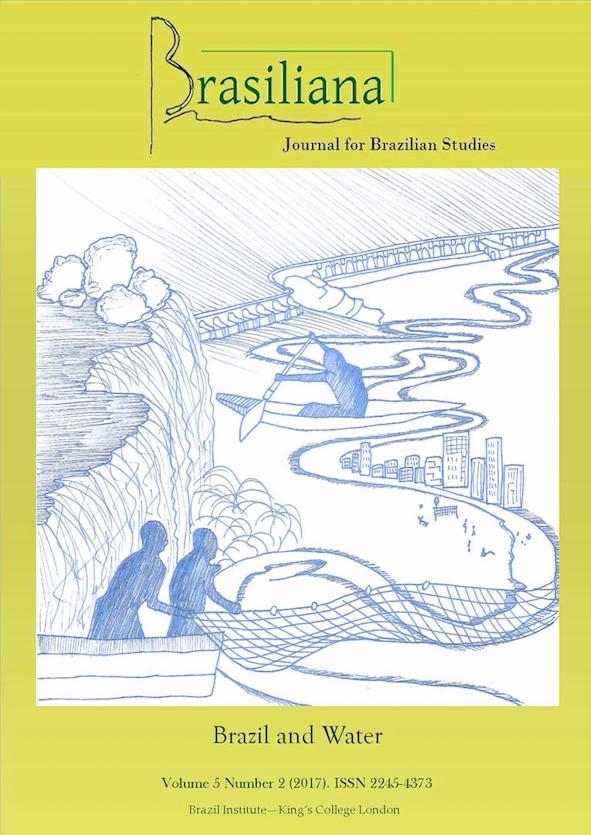Vamos para Rua! Taking to the Streets Protest in Brazil
Conteúdo do artigo principal
Resumo
Detalhes do artigo
![]()
Articles published in Brasiliana are licensed under a Creative Commons Attribution-NonCommercial-NoDerivs 3.0 Unported License.
When publishing open access, the author signs an author publishing agreement in which they retain copyright and give Brasiliana the right to publish the article. Our Open Access publications are distributed under the terms of the Creative Commons Attribution 4.0 International License, which permits unrestricted use, distribution, and reproduction in any medium, provided the original work is properly cited.
Referências
Almeida Paul D. “Defensive Mobilization: Popular Movements against Economic Adjustment Policies in Latin America.” Latin American Perspectives 34/3 (2007): 123-139. Almond, G. and Verba, S. The Civic Culture: political attitudes and democracy in five nations. New York: Sage, 1969. Anderson, Christopher J., and Silvia M. Mendes. "Learning to lose: Election outcomes, democratic experience and political protest potential." British Journal of Political Science 36, no. 01 (2006): 91-111. Arce Moisés. “The Repoliticization of Collective Action after Neoliberalism in Peru.” Latin American Politics and Society 50/3 (2008): 37-62. Arce, Moises. "Parties and Social Protest in Latin America's Neoliberal Era." Party Politics 16/5 (2010): 669-686. Assies, William. “David and Goliath in Cochabamba: Water Rights, Neoliberalism, and the Revival of Social Protest in Bolivia.” Latin American Perspectives 30/3 (2003): 14-36. Banks, A. “Databanks International: Cross-national time series data archive. Accessed June 30, 2015. http://www.cntsdata.com Booth, J.A. Cultura política de la democracia en Nicaragua, 2010. Consolidación democrática en las Américas en tiempos difíciles. Americas Barometer by LAPOP, Vanderbilt University. Dalton, R. and Sickle, A.V. “The resource, structural and cultural bases of protest.” Center for the Study of Democracy. 2005. Accessed June 2014. <http://repositories.cdlib.org/csd/05-11>. Epstein, Edward. C. “The Piquetero Movement of Greater Buenos Aires: Working Class Protest During the Current Argentine Crisis.” Canadian Journal of Latin American and Caribbean Studies 28/55/56 (2003): 11-36. Gingerich, Daniel W. ‘‘Corruption and Political Decay: Evidence From Bolivia.’’ Quarterly Journal of Political Science 4 (2009): 1–34. Gurr, T.R. “A Causal Model of Civil Strife: a Comparative Analysis using New Indices.” American Political Science Review, 62/4 (1968): 1104-24. Hagopian, Frances, Gervasoni, Carlos, & Moraes, Juan Andrés. “From patronage to program: The emergence of party-oriented legislators in Brazil.” Comparative Political Studies 42/3 (2009) : 360-391. Holston, James. "'Come to the Street!' Urban Protest, Brazil 2013." Anthropological Quarterly 87/3 (2014): 887-900. IBGE. Brazilian Institute of Geography and Statistics. Pesquisa Mensal de Emprego. Accessed June 2014. <http://www.sidra.ibge.gov.br/bda/pesquisas/pme/default.asp> Inglehart, R. “The silent revolution in Europe: Intergenerational change in post-industrial societies.” American Political Science Review 65/4 (1971): 991-1017. Inglehart, R. The Silent Revolution. Princeton, NJ: Princeton University Press, 1977. Inglehart, R. “Value Change in the Uncertain 1970s.” In Management under Differing Value Systems, ed. G. Dlugos and K. Weiermeier. Berlin: de Gruyter, 1981. Inglehart, R. Culture shift in advanced industrial society. Princeton University Press, 1990. Inglehart, R. and Catterberg, G. “Trends in political action: The developmental trend and the post-honeymoon decline. International Journal of Comparative Sociology (43(3-5): 300-316, 2002. Inglehart, R. and Welzel, C. Modernização, mudança cultural e democracia: a sequência do desenvolvimento humano. São Paulo: Francis 2009. Keefer, Philip. DPI2012 "Database of political Institutions: Changes and Variable Descriptions" Development Research Group, the World Bank, 2012. Kingstone, Peter, Joseph K. Young, and Rebecca Aubrey. "Resistance to Privatization: Why Protest Movements Succeed and Fail in Latin America." Latin American Politics and Society 55/3 (2013): 93-116. Long, J.S. and Freese, J. Regression Models for Categorical Dependent Variables using Stata. Stata Press, 2006. Machado, Fabiana; Scartascini, Carlos; Tommasi, Mariano. “Political Institutions and Street Protests in Latin America” Journal of Conflict Resolution 55/3 (2011): 340-365. Melo, Carlos Ranulfo. “The 2014 Elections and the Brazilian Party System” Brazilian Political Science Review 9/1 (2015): 93-114. Moseley, Mason, and Matthew Layton. “Prosperity and Protest in Brazil: The Wave of the Future for Latin America?” AmericasBarometer Insights 93, Nashville, Tennessee: Vanderbilt University, 2013. www.vanderbilt.edu/lapop/insights/IO893en.pdf Accessed March 1, 2014. Norris, P. “Political Activism: New Challenges, New Opportunities.” In The Oxford Handbook of Comparative Politics, ed. Boix, Stokes. Oxford: Oxford University Press, pp. 628-652, 2007. Ortiz, David G., and Sergio Bejar. "Participation in IMF-sponsored economic programs and contentious collective action in Latin America, 1980-2007." Conflict Management and Peace Science 30/5 (2013): 492-515. Reiter, Bernd. "What's New in Brazil's ‘New Social Movements?’" Latin American Perspectives 38/1 (2011): 153-168. Ribeiro, E. A. “A consistência das medidas de pós-materialismo: testando a validade dos indices propostos pro R. Inglehart no context Brasileiro.” Sociedade e Estado, Brasília, 22/2 (2007): 371-400. Roberts, Kenneth M. "The Mobilization of Opposition to Economic Liberalization." Annual Review of Political Science 11 (2008): 327-349. Roberts, Kenneth M. "Market Reform, Programmatic (De)alignment, and Party System Stability in Latin America." Comparative Political Studies 46/11 (2013): 1422-1452. Romano Sarah T., “From Protest to Proposal: The Contentious Politics of the Nicaraguan Anti-Water Privatization Social Movement,” Bulletin of Latin American Research 31/4 (2012): 449-514. dos Santos, F. “Brazil’s Remarkable Journey.” (2005) Accessed June 30, 2015. http://www.imf.org.external/pubs/ft/fandd/2005/06/fonseca.htm Schatzman, Christina. “Political Challenge in Latin America: Rebellion and Collective Protest in an Era of Democratization” Journal of Peace Research 42/3 (2005): 291-310. Scott, L.J. Regression models for categorical and limited dependent variables, volt 7. Sage Publications, 1997. Singer, Andre. "Rebellion in Brazil: Social and Political Complexion of the June Events." New Left Review 85(2014):19-37. Taylor, Matthew M. "Brazil's Ebbing Tide." Current History 113/760 (2014): 57-63. Taylor, Matthew M. and Vínícius Buranelli. "Ending Up in Pizza: Accountability as a Problem of Institutional Arrangement in Brazil." Latin American Politics and Society 49/1 (2007): 59-87. Valente, R. R. And Berry, B.J.L. “Countering Inequality: Brazil’s Movimento Sem Terra,” Geographical Review 105/3 (2015): 263-282. Verba, S., Scholozman, K.L., and Brady, H.E. Voice and Equality: Civic Viluntarism in American Politics. Cambridge, MA. Harvard University Press, 1995.

